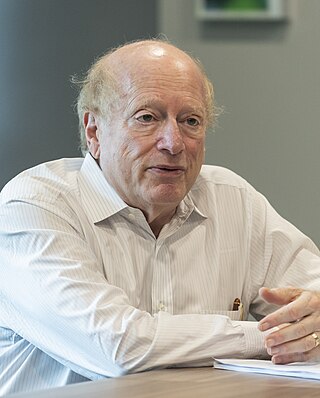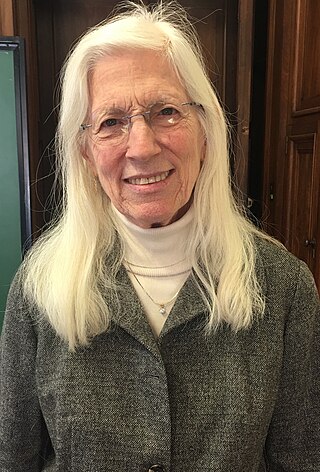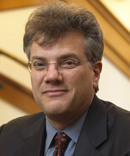Louis Michael Seidman | |
|---|---|
| Born | 1947 (age 76–77) [1] |
| School | Critical Theory |
Main interests | Legal philosophy |
Notable ideas | Critical Legal Studies, theory of constitutional unsettlement |
Louis Michael Seidman (born 1947) is the Carmack Waterhouse Professor of Constitutional Law at Georgetown University Law Center in Washington, D.C.. He is a constitutional law scholar and major proponent of the critical legal studies movement. Seidman's 2012 work is On Constitutional Disobedience, [2] where Seidman challenges the viability of political policy arguments made in reference to constitutional obligation.
Seidman received an A.B. from University of Chicago and a J.D. from Harvard Law School in 1971. After graduation, he clerked for D.C. Circuit Judge Skelly Wright and later clerked for Justice Thurgood Marshall. Following his clerkship, Seidman joined the Public Defender Service for the District of Columbia. [3]
Seidman is known for his contributions to constitutional legal theory, principally his theory of unsettlement put forward in his book Our Unsettled Constitution: A New Defense of Constitutionalism and Judicial Review (Yale 2001). [4] Drawing from the critical legal studies indeterminacy thesis, Seidman argues that because constitutional law cannot settle fundamental political disputes, constitutional legal discourse and judicial review instead act to "unsettle" them. Rather than resolving conflicts definitively, the temporary resolution of any controversy in constitutional law through judicial review leaves open the possibility that the losing side may make an equally plausible alternative constitutional argument. In this way, both the prevailing and losing sides in a dispute recognize their positions as unstable and subject to revision within the recognized standards of legal argument. As a result, both winners and losers have reasons to continue their debate within the framework of constitutional law, thereby keeping all parties at the table and consolidating the legal system.
Seidman's defense of judicial review provided a counterpoint within the critical legal studies school to his colleague and sometime collaborator Mark Tushnet's attack on judicial review as undemocratic.
In addition to Seidman's theory of judicial review, he is also known for his constitutional law casebook, co-authored with Pamela Karlan, Mark Tushnet, Geoffrey Stone and Cass Sunstein. [4] Seidman is also noted for his work in criminal law and his book Silence and Freedom. [5]
In 2009, Seidman was interviewed on Fora tv about healthcare policy in the United States, defending the constitutionality of the individual mandate of the Affordable Care Act against right-wing and pro-corporate criticism. [6]
{{cite book}}: |work= ignored (help){{cite web}}: CS1 maint: unfit URL (link)Critical legal studies (CLS) is a school of critical theory that developed in the United States during the 1970s. CLS adherents claim that laws are devised to maintain the status quo of society and thereby codify its biases against marginalized groups.

Originalism is a legal theory that bases constitutional, judicial, and statutory interpretation of text on the original understanding at the time of its adoption. Proponents of the theory object to judicial activism and other interpretations related to a living constitution framework. Instead, originalists argue for democratic modifications of laws through the legislature or through constitutional amendment.

John Hart Ely was an American legal scholar. He was a professor of law at Yale Law School from 1968 to 1973, Harvard Law School from 1973 to 1982, Stanford Law School from 1982 to 1996, and at the University of Miami Law School from 1996 until his death. From 1982 until 1987, he was the 9th dean of Stanford Law School.
Reva B. Siegel is the Nicholas deB. Katzenbach Professor of Law at Yale Law School. Siegel's writing draws on legal history to explore questions of law and inequality, and to analyze how courts interact with representative government and popular movements in interpreting the Constitution. She is currently writing on the role of social movement conflict in guiding constitutional change, addressing this question in recent articles on reproductive rights, originalism and the Second Amendment, the "de facto ERA," and the enforcement of Brown. Her publications include Processes of Constitutional Decisionmaking ; The Constitution in 2020 ; and Directions in Sexual Harassment Law. Professor Siegel received her B.A., M.Phil, and J.D. from Yale University, clerked for Judge Spottswood William Robinson III on the D.C. Circuit, and began teaching at the University of California at Berkeley. She is a member of the American Academy of Arts and Sciences, and is active in the American Society for Legal History, the Association of American Law Schools, the American Constitution Society, in the national organization and as faculty advisor of Yale's chapter. She was elected to the American Philosophical Society in 2018.
Michael William McConnell is an American jurist who served as a United States circuit judge of the United States Court of Appeals for the Tenth Circuit from 2002 to 2009. Since 2009, McConnell has been a professor and Director of the Stanford Constitutional Law Center at Stanford Law School. He is also a senior fellow at Stanford University's Hoover Institution, and Senior Of Counsel to the Litigation Practice Group at Wilson Sonsini Goodrich & Rosati. In May 2020, Facebook appointed him to its content oversight board. In 2020, McConnell published The President Who Would Not Be King: Executive Power under the Constitution under Princeton University Press.

David E. Bernstein is an American legal scholar at the George Mason University School of Law in Arlington, Virginia, where he has taught since 1995. His primary areas of scholarly research are constitutional history and the admissibility of expert testimony. Bernstein is a contributor to the legal blog The Volokh Conspiracy. Bernstein is a graduate of the Yale Law School, where he was a John M. Olin Fellow in Law, Economics and Public Policy, a Claude Lambe Fellow of the Institute for Humane Studies, and a senior editor of the Yale Law Journal. He received his undergraduate degree from Brandeis University.

Mark Victor Tushnet is an American legal scholar. He specializes in constitutional law and theory, including comparative constitutional law, and is currently the William Nelson Cromwell Professor of Law at Harvard Law School. Tushnet is identified with the critical legal studies movement.

Jack M. Balkin is an American legal scholar. He is the Knight Professor of Constitutional Law and the First Amendment at Yale Law School. Balkin is the founder and director of the Yale Information Society Project (ISP), a research center whose mission is "to study the implications of the Internet, telecommunications, and the new information technologies for law and society." He also directs the Knight Law and Media Program and the Abrams Institute for Free Expression at Yale Law School.

Frank Isaac Michelman is an American legal scholar and the Robert Walmsley University Professor Emeritus at Harvard Law School.
Constitutional theory is an area of constitutional law that focuses on the underpinnings of constitutional government. It overlaps with legal theory, constitutionalism, philosophy of law and democratic theory. It is not limited by country or jurisdiction.

Cornelius Adrian Comstock Vermeule is an American legal scholar who is currently the Ralph S. Tyler Professor of Constitutional Law at Harvard Law School. He is an expert on constitutional and administrative law, and, since 2016, has voiced support for Catholic integralism. He has articulated this into his theory of common-good constitutionalism.
Cynthia Estlund is the Catherine A. Rein Professor of Law at the New York University School of Law.

Margaret Jane Radin is the Henry King Ransom Professor of Law, emerita, at the University of Michigan Law School by vocation, and a flutist by avocation. Radin has held law faculty positions at University of Toronto, University of Michigan, Stanford University, University of Southern California, and University of Oregon, and has been a faculty visitor at Harvard University, Princeton University, University of California at Berkeley, and New York University. Radin's best known scholarly work explores the basis and limits of property rights and contractual obligation. She has also contributed significantly to feminist legal theory, legal and political philosophy, and the evolution of law in the digital world. At the same time, she has continued to perform and study music.

Richard H. Pildes is the Sudler Family Professor of Constitutional Law at the New York University School of Law and a expert on constitutional law, the Supreme Court, the system of government in the United States, and legal issues concerning the structure of democracy, including election law. His scholarship focuses on public law and legal issues affecting democracy.
The Harvard Law & Policy Review is a law journal and the official journal of the American Constitution Society, a progressive legal organization. It was established in 2007. The journal publishes two printed editions per year, as well as additional content posted exclusively online. It is edited by Harvard Law School students and typically has a staff of approximately 75 students. The journal publishes articles presenting progressive ideas for law and policy written by legal scholars, policymakers, practitioners, and students.
The rule according to a higher law is a statement which expresses that no law may be enforced by the government unless it conforms with certain universal principles of fairness, morality, and justice. Thus, the rule according to a higher law may serve as a practical legal criterion to qualify the instances of political or economical decision-making, when a government, even though acting in conformity with clearly defined and properly enacted law, still produces results which many observers find unfair or unjust.
Constitutionalism is "a compound of ideas, attitudes, and patterns of behavior elaborating the principle that the authority of government derives from and is limited by a body of fundamental law".
Gary Peller is Professor of Law at Georgetown University Law Center and a prominent member of the critical legal studies and critical race theory movements.
Judicial populism or juridical populism is a phenomenon where the judgments and actions of the courts are driven by the perception of the masses or certain groups. The term, which some refer to as popular constitutionalism, has been described as a reaction to the perceived elitist bias in the legal system.

Common good constitutionalism is a legal theory formulated by Harvard law professor Adrian Vermeule that asserts that "the central aim of the constitutional order is to promote good rule, not to 'protect liberty' as an end in itself". Vermeule describes it as an attempt to revive and develop the classical legal tradition by understanding enacted law as a positive application of background natural law principles. Within this tradition, he claims law is defined as "an ordinance of reason promulgated by political authorities for the common good." Vermeule states that law in this sense is "not tethered to particular written instruments of civil law or the will of the legislators who created them" but instead embody rational determinations of the common good, and it is those determinations, as well as the natural law background against which they are made, which constitute the law. Vermeule says that these principles include "a candid willingness to "legislate morality."